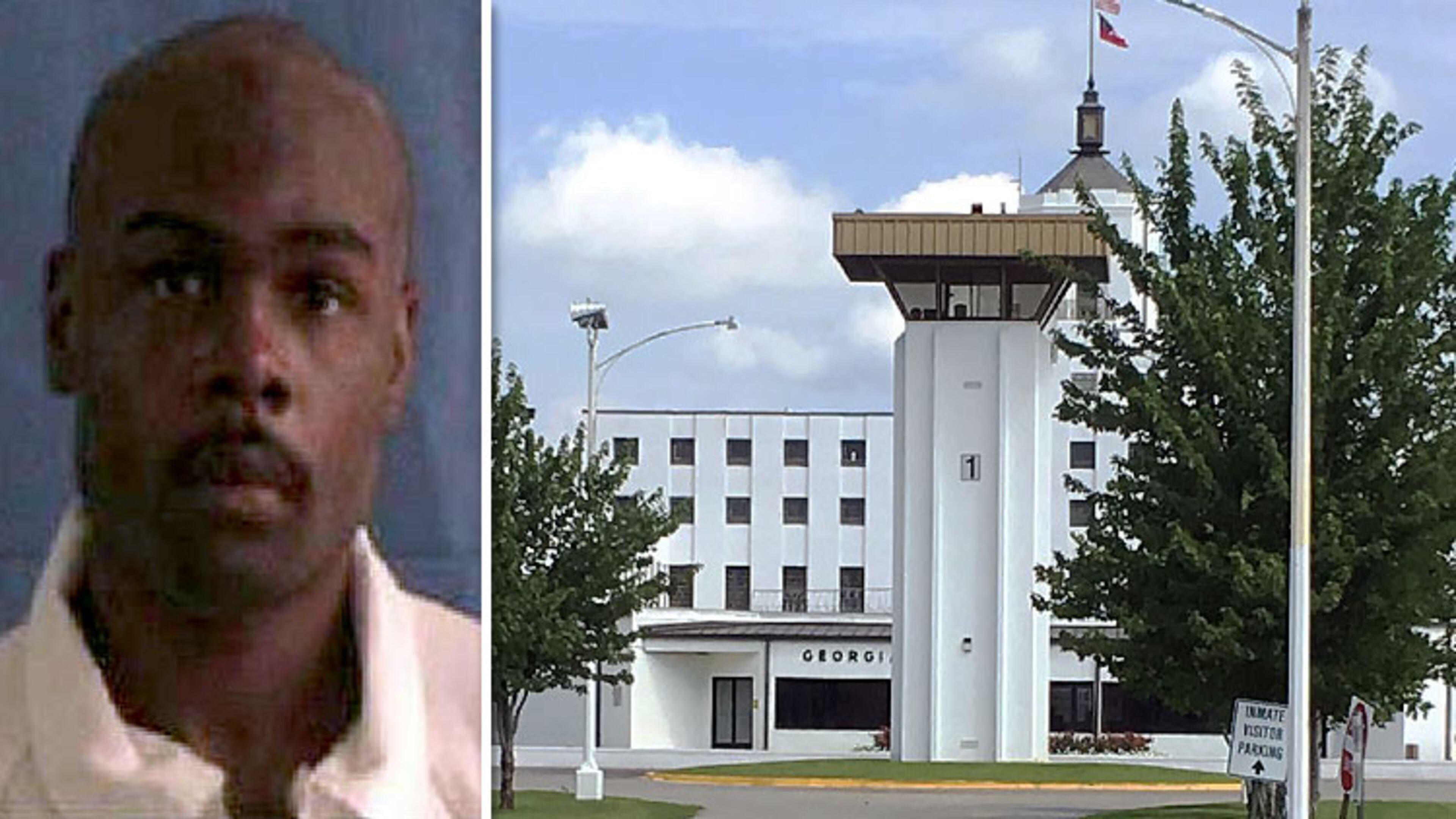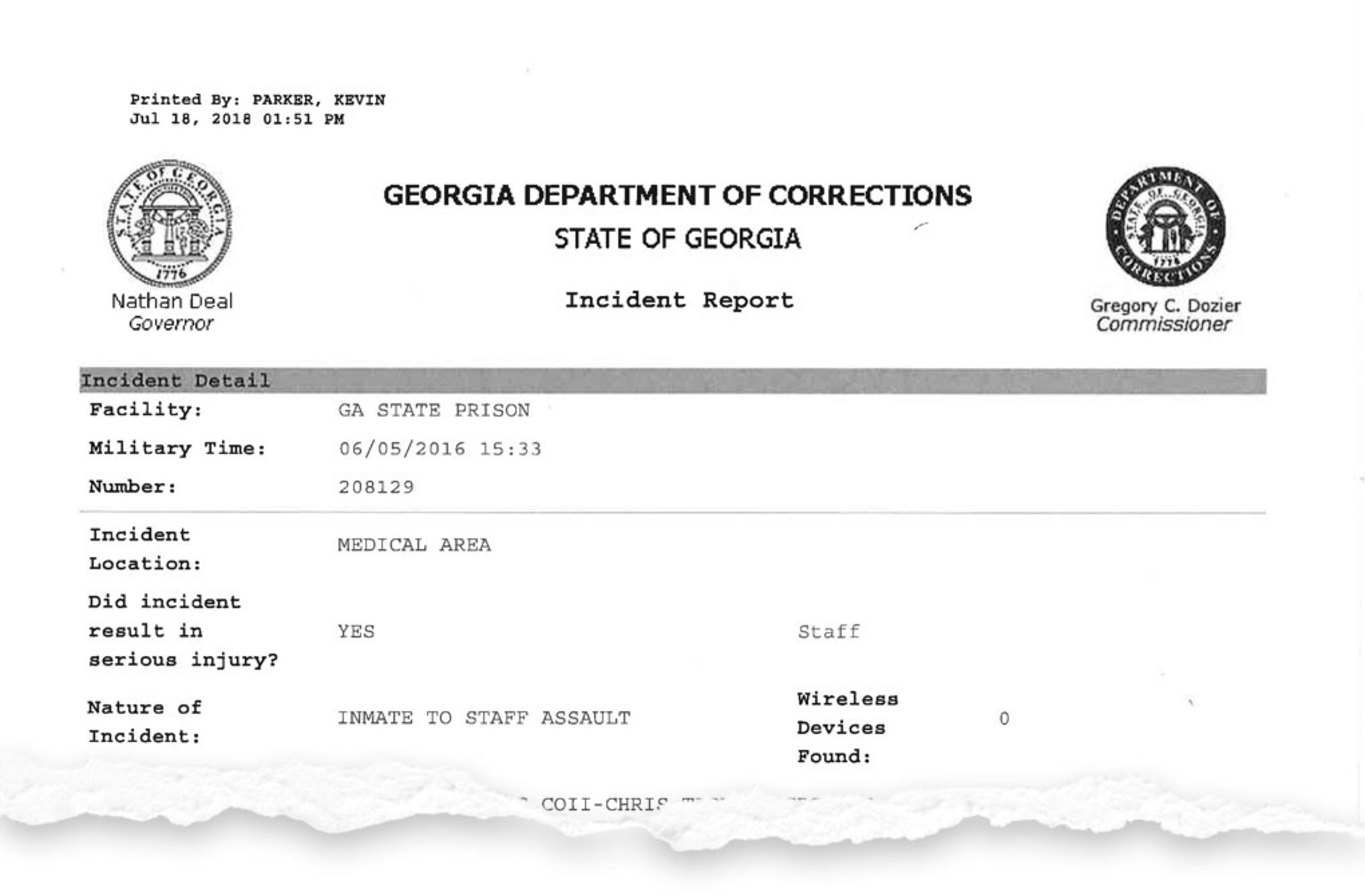Violent attack on Georgia prison nurse points to major security breach

As Alicia Butler remembers it, the day was going along pretty much like all the others when the ambush occurred.
One minute she was working alone in the small upstairs room where medication is stored at Georgia State Prison, part of her duties as a prison nurse, and the next she was on the floor, struggling with an inmate she believed was bent on killing her.
"My prayer was, `Lord, don't let them find me dead up here,'" she said, recalling the moment. "So my intention was to fight until somebody came."

The 2016 attack is now the subject of a lawsuit that gives a harrowing look at one nurse’s ordeal and raises some of the most serious questions to date about the safety of medical personnel working in Georgia Department of Corrections facilities.
Butler is suing the Department of Corrections alleging that its failure to supervise a dangerous offender, Carlos Johnson Jr., led to a savage beating that left her with injuries to her neck, face and shoulder.
In her lawsuit, filed in May, the 42-year-old single mother of three describes losing consciousness several times as Johnson, a serial rapist from DeKalb County, pinned her between a desk and the wall and repeatedly choked and punched her. When she was discovered by an officer, her pants and underwear were pulled down past her thighs and her clothes were soaked with urine.

A rape kit did not indicate that sexual contact had occurred. However, Butler is being regularly tested for HIV because she learned after the attack that Johnson is HIV positive, according to the lawsuit. Those tests have also proven negative.
The lawsuit suggests that Johnson, who has been charged with two counts of aggravated assault, was able to slip unnoticed into the room where Butler was working because only one officer was providing security in the medical unit. Under GDC policy, at least five officers should have been present, the suit contends.
In a series of stories last year, The Atlanta Journal-Constitution detailed how security lapses at Augusta State Medical Prison, the state's chief correctional medical facility, caused several nurses to quit in fear for their safety.
But the Butler case suggests a more serious breach in which an inmate with a particularly violent history was allowed to roam free.

Johnson, 30, has been in the Georgia prison system since he received a life sentence in 2006 for sexually assaulting two women in and around a Decatur apartment complex. The attacks were among seven that DeKalb County prosecutors charged him with committing during a four-month period in 2004, all following a similar pattern in which his victims were choked and sodomized.
Stephen Lowry, one of Butler’s attorneys, said the medical unit at Georgia State Prison encompasses two floors. On the afternoon of June 5, 2016, the only guard on duty was stationed on the first floor, making it possible for Johnson to enter the room where Butler was working on the second floor and carry out the attack, Lowry said.
"I don't have any idea how you could let someone like (Johnson) alone with anyone, particularly a female," Lowry said. "In my mind, that's a big question: How could the Georgia Department of Corrections let this happen?"
Joan Heath, director of the GDC’s office of public affairs, said the pending litigation prevents anyone from the department from commenting.

The incident report prepared at the prison notes that an “inmate to staff assault” involving Johnson occurred at 3:33 p.m. on June 5, 2016, but the report has no statements from the individuals involved. Responding to an open records request from the AJC, the GDC said the document was the only one related to the investigation it could make public because of the ongoing criminal case.
A dangerous job
Butler’s lawsuit comes at a time when a spate of high-profile assaults on nurses have focused attention on the vulnerability inherent in the profession.
In one incident that drew national headlines last year, a jail inmate who underwent surgery at a suburban Chicago hospital abducted two nurses, one of whom claimed she was sexually assaulted. In another, an emergency room patient in Massachusetts stabbed a nurse because he was unhappy with the care she was providing.
In its reporting on the conditions at Augusta State Medical Prison, the AJC described how three nurses were forced to flee the crisis stabilization unit when an inmate broke out of his cell last August. All three subsequently resigned.
Pam Cipriano, the president of the American Nurses Association, said nurses working in prisons, psychiatric hospitals and other high-risk facilities typically can expect heightened security, but system breakdowns often put those nurses in harm's way.
After reading portions of Butler’s lawsuit, Cipriano called the matter “pretty extreme,” but not shocking.
“I do not want to seem callous, but, unfortunately, it did not shock me, because I’m very much aware that these things happen,” she said.
Recalling that day
Butler said she had no idea who Johnson was and in fact had never seen him before the day she says he attacked her.
She said Johnson first came in asking for his medication and was told that he would have to wait for it to be delivered. He left and didn’t seem angry, she said. But a few minutes later, he was back, closing the door behind him, she said.
Sensing trouble, Butler said she quickly reached for the phone, but Johnson knocked it out of her hands.
“At that moment, it was just kind of fear,” she said. “I feared for my life.”
Butler said she slipped in and out of consciousness three times as Johnson choked and punched her for about 20 minutes. He left on his own, apparently so he could be at his cell for the afternoon count, she said.
"I was yelling, but I don't know how loud I was yelling, because my throat was hurting," she said. "Finally, I was able to crawl to the phone, and, about that time, the officer walked in."
It wasn’t until she was pulled from the room that she realized her pants had been lowered and there was urine on her clothes.
“I was soaked in urine,” she said. “I don’t know if it was my urine or his urine, but there was definitely urine on me.”
Doctors who examined Butler at East Georgia Regional Medical Center in Statesboro determined that she had been punched and choked with a phone cord. They found bruises to her neck and upper torso and made a diagnosis of “asphyxiation strangulation; pain in left shoulder — post assault.”

In charging Johnson with aggravated assault, Tattnall County prosecutors contend that he tried to rape Butler “by choking her to the point of unconsciousness.” They have also charged him with false imprisonment and hindering an emergency telephone call.
Johnson, who has been incarcerated at Augusta State Medical Prison since Butler was attacked, has pleaded not guilty to the charges.
Assaults in DeKalb
Butler's description of Johnson's attack is chillingly similar to those he committed in DeKalb County.
In one case, a woman was on a bike path in Clarkston when Johnson threw her to the ground, beat her and choked her so violently that the blood vessels in her eyes ruptured. He then tore off her clothes and inserted his fingers in her vagina.
Another was choked until she was unconscious in her apartment. Later, her rape exam found Johnson’s DNA.
Johnson was charged with committing those attacks and five others while living with his father in the Colonial Garden Apartments on McLendon Drive just a month after he was released from juvenile custody for sexually assaulting children.

At the sentencing, the prosecutor who dealt with the case, Ingrid Skidmore, described all seven of the alleged offenses in detail and explained that, even though Johnson’s guilty plea involved only two, every victim had agreed to the deal.
“Two have moved out of state as a result of this,” she told the judge. “It is not that they are unwilling to come to court — there are actually a couple of victims here today — but they don’t want to go through this. This is obviously the worst thing that ever happened to them in their lives. They want to be able to move on.”
Skidmore also cited a juvenile history in which Johnson molested the 6-year-old son of his father’s girlfriend, put a pillow over the face of a psychiatrist treating him and sexually assaulted his 11-year-old roommate at the Georgia Center for Youth.
Although the sentence left open the possibility of parole, the county’s district attorney at the time, Gwendolyn Keyes Fleming, vowed that her office would “do everything in its power” to ensure that Johnson, then 19, would never be released from prison.
Seeking accountability

A life-long resident of Tattanall County, home to three Department of Corrections facilities, Butler was a nurse at Georgia State Prison for 12 years until the incident caused her to quit. Her mother also was a nurse at the prison, working there more than 30 years.
Butler acknowledged that, given those ties, the decision to sue the department wasn’t an easy one. However, in the end, making it aware that it has a problem overrode all other concerns, she said.
"I would say generally there's some responsibility that they have," she said. "That's basically where I'm at. I want them to take their responsibility."
Since the incident, she has seen a counselor in Statesboro every two weeks and a psychiatrist in Savannah once a month.
“The counselor has helped tremendously,” she said. “I’ve been talking to her since July 2016, and I don’t know where I’d be mentally if I couldn’t talk to her.”
She is tested for HIV every three months, she said.
“It’s something I’ll probably do forever,” she said.
As for whether she will work as a nurse again, she isn’t sure. There are other things she must deal with first.
“As I’ve said to my counselor, I just want to open my eyes and say this is all a bad dream,” she said. “I just want to be normal.”
About this story
In a series of award-winning investigations, reporter Danny Robbins has detailed how callous medical treatment at Georgia prisons has put inmates at risk and led to costly legal settlements.
He revealed how women inmates suffered agonizing deaths after being denied essential medical care, while others were forced to wait months to see cancer specialists or other doctors. He also has described unsafe and unsanitary conditions at the state’s prison hospital and security gaps at the facility that put healthcare providers at risk.
Now, in Robbins’ latest story, a prison nurse tells of a brutal attack by a particularly dangerous inmate who was roaming unsupervised.



